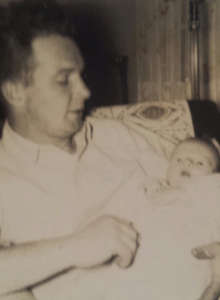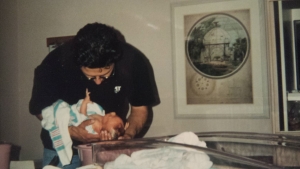These days, it seems that dads have taken on a more prominent role when it comes to raising the kids. Dads are not just showing up at baseball or soccer games but are attending the parent/teacher conferences and sometimes even making the play date arrangements.
Where has this new sense of fatherhood stemmed from? What role reversal has evolved in the new millennium that has made it politically correct for men to even don the new fangled breast feeding devices that, up until a few years ago, that duty, by nature, was for moms only?
Old School Parenting
My own father was a child of The Great Depression. And, when I asked him once what his father did for a living, his response was, “whatever he could, kid.” His reply made me realize how many generations of fathers never had the luxury of truly participating in a child’s life. These dads of the early and mid part of the 20th century, who racked up long hours and put in enough overtime as it took to afford the bicycle at Christmas time or new baseball glove.
The generation of fathers who came home after long shifts and had just enough time to eat what might be left of the evening’s supper, maybe have a drink and then fall into bed and get up again the next day to do it all again.
Father Knows Best
When I was born, my mother was 40 and my dad was 43. I was the last of 8, so neither one of them had the luxury of just enjoying a “late in life” baby. They had seven others under the age of 13.
Here was a man in the prime of his life with another mouth to feed and another life to preside over. I feel blessed to have been raised by a father who was both strict but fair and while he may not have spent much time in my actual raising, his presence in my early years is engraved in my memory.
For the fathers of my father’s generation, time was a commodity. So even though his time was limited, I know that the quality of his time is what made a difference in the choices I have made in my life. From my father, I learned a number of lessons, including the importance of a true work ethic, the meaning of self-respect, the practice of gratefulness and perhaps the most important insight, “never lose your sense of humor, kid.”
Midlife Fathering
My husband became a father for the second time at the age of 44, close enough to my own father’s age when I came along. I am not sure what the difference has been in his fathering practice but I know there is one. With ten years between our children, I think that he has mellowed in a manner that has made him more aware of the choices we make as parents on a daily basis, how they impact our children.
My husband has had the luxury of enjoying and engaging with his son since the day he was born, because our world and the role of men in the raising of children has changed so drastically in the last fifty years.
In The Name of the Father
Pops, dad, father, sir, or even “the old man.” The salutations may be different, but they all embody one notion: the endearment of the male energy when it comes to raising a child.
Not everyone has been fortunate enough to have a good father in his or her lives, but for those who have it is a relationship that should be nurtured and treasured. Whether you are a new father at age 20, 40, 60, or in the case of Tony Randall, 77, the art of fatherhood is delicate. It requires walking that walk and bestowing on children the wisdom of your age, no matter the age.
How many men define themselves by what they do in life, their careers, their way of supporting the family, etc. How different the world might be if men defined themselves by the way they parent their children. No matter what any man achieves in his life and career, if he is blessed, in his lifetime, to be given the chance to raise a child, it is his most important role ever.
In the great words of Umberto Eco, “I believe that what we become depends on what our fathers teach us at odd moments, when they aren’t trying to teach us. We are formed by little scraps of wisdom.”


